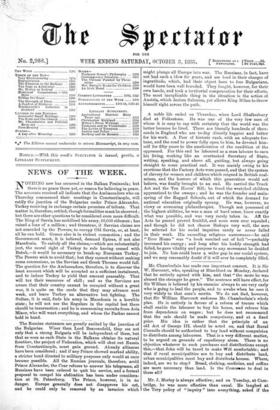A noble life ended on Thursday, when Lord Shaftesbury died
at Folkestone. He was one of the very few men of whom it is easy to say with certainty that the world was the better because he lived. There are literally hundreds of thou- sands in England who are to-day directly happier and better for his work. A Peer of historic rank, with an adequate for. tune, and the road to power fully open to him, he devoted him- self for fifty years to the amelioration of the condition of the oppressed. For this end he laboured as a man labours to earn his living, working like an overtasked Secretary of State, writing, speaking, and above all, guiding, but always going straight to some practical end. It was mainly owing to his exertions that the Factory Acts were passed, and that the system of slavery for women and children which reigned in British coal- mines, and the horrors of which this generation would not believe, was finally brought to an end. He carried the Truck Act and the Ten Hours' Bill ; he freed the wretched children apprenticed to the sweeps ; and he was the founder and main- spring of the Ragged Schools, out of which the demand for national education originally sprang. He was, however, no viewy or screaming philanthropist. Though not possessed of the highest abilities, he was a man of hard sense, knew exactly what was possible, and was very rarely taken in. A the Acts he passed proved fruitful, and none were ever repealed ; and though he did not choose Bishops very well, the men he selected for his social inquiries rarely or never failed in their work. His exceeding religious narrowness—he said " Ecce Homo" was "a book vomited out of hell "—probably increased his energy ; and long after his bodily strength had failed, he gave vitality and purpose to any movement he decided to join. No loss could leave a wider gap in our social system, and we may reasonably doubt if it will ever be completely filled.














































